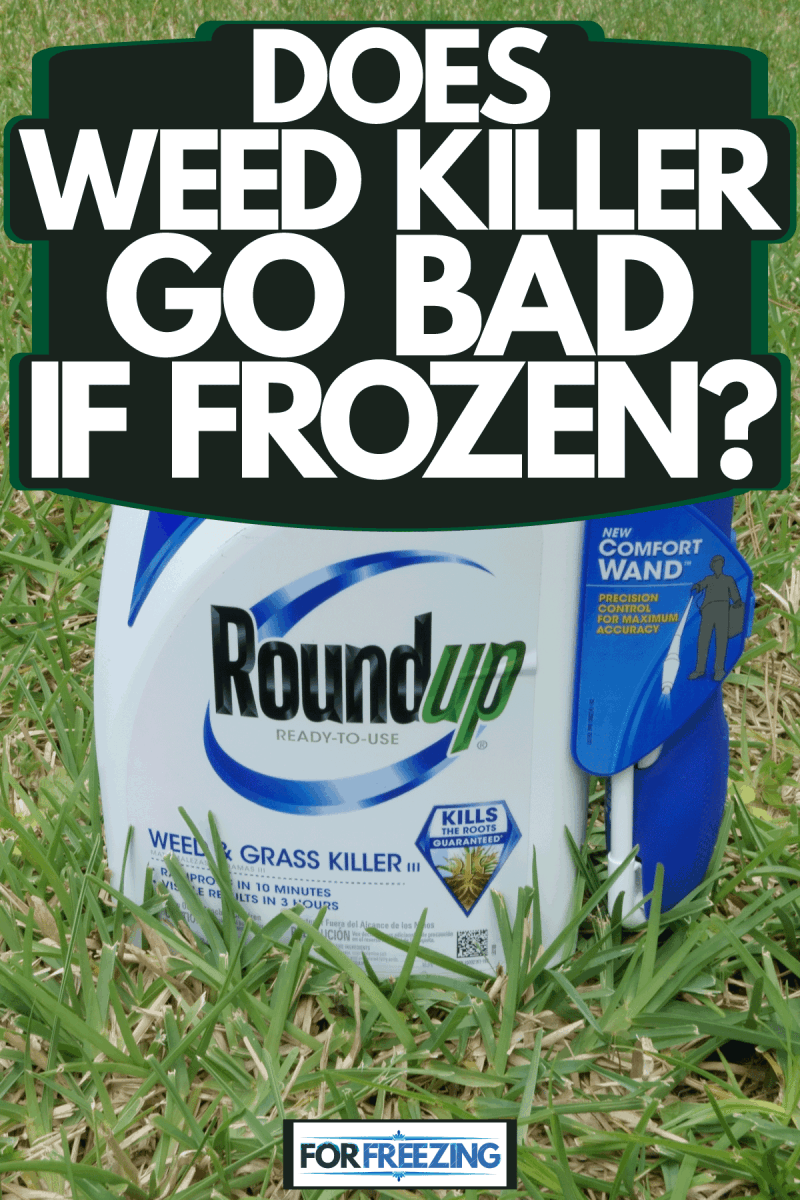Using weed killer or herbicides is one of the easy and quick ways to eliminate unwanted plants growing in your yard. The tendency is to buy them, use them, and then store the rest for later. But will your leftover weed killer survive the winter? Don’t worry because we’ve done the research to give you the answers on herbicides and their reactions to freezing temperatures.
Weed killer does not necessarily go bad after freezing. Dry formulations, for example, aren’t affected by low temperatures. However, in liquid formulations, the ingredients can separate and then crystallize or coagulate. When that happens, some formulations become unsuitable for use while others can be thawed, shaken, and reused. Also, with freezing, you risk the product’s container breaking because the liquid expands with the cold temperature.
Now that you know that it might not be best to let your weed killer freeze, you might ask, how then do you store it? Keep on reading, and we’ll give you tips on how to properly store your herbicide and answer questions on different herbicides and what happens if they freeze.
NOTE: WE MAY GET A COMMISSION IF YOU DECIDE TO MAKE A PURCHASE THROUGH THESE LINKS. THERE'S ADDITIONAL NO COST TO YOU. CHECK THE BOTTOM OF THE PAGE FOR MORE INFORMATION.

How to properly store weed killer
Part of the responsibility of using weed killers is proper storage. When you put your herbicides in the right place, it protects the environment from potentially harmful chemicals. It also protects your product from the elements that could degrade it or cause it to be less effective.
When deciding on where to store your weed killer, keep the following things in mind:
1. Read the label on Your herbicide
Herbicides are formulated differently between brands. Therefore, they tend to have different storage instructions. As per EPA guidelines, all herbicides should have their storage information written on the bottle or label, so you should make sure to read those carefully and follow them.
2. Watch out for temperature changes that might affect your herbicide
The general temperature range for liquid herbicide storage is approximately 40 to 100 degrees Fahrenheit. Accordingly, different brands usually have their product’s temperature thresholds on the label, so it’s always good to check.
Both heat and freezing temperatures can affect your weed killer. When it’s too hot, your weed killer can evaporate, especially if its container isn’t closed well. It also produces volatile gases, which can cause fires when exposed to open flame.
Freezing temperatures cause the active ingredients in liquid herbicides to separate, then crystalize or coagulate. When this happens, the formula might not work anymore.
Fortunately, you can fix this problem by leaving the weed killer in a warm area over several days and occasionally shaking the container. However, some formulations might not go back to their original consistency, and you should avoid using them.
Freezing temperatures can also cause the liquid in the weed killer to expand and break the containers. To avoid this problem, try to avoid buying excess herbicides. That way, you won’t need to store them over the winter, and there will be less product prone to breaking.
Dry formulations are not affected by temperatures like their liquid counterparts, but they are prone to hardening when moisture gets into the packaging. When these formulas become moist and hard, they are not as effective or usable.
3. Choose your herbicide’s storage space
First, choose a place that is unlikely to be exposed to fire or flooding. The chemicals in herbicides can be toxic and volatile, so putting them somewhere exposed to these conditions will be dangerous.
Next, choose somewhere that is far away from a groundwater source or a body of water. Any leaks in the bottle can leach into the ground, and runoff can bring these chemicals into the water. Your weed killer should be at least 200 feet from any body of water, water sources, wells, etc.
Also, store them away from pets or children. They should not be kept in cabinets near food or medical supplies. Preferably, they should be in a well-ventilated shed or storage area outside the home in a locked cabinet.
The floor should be concrete with a clear label or sign posted near the storage area. Store dry products above liquid ones so they won’t mix if there’s a leak. Lastly, always check the packaging for any leaks, cracks, or tears before storage.
How long does weed killer last in the bottle?

Some herbicides do not have an expiration date indicated on their bottle. However, this does not mean that they do not expire. Some sources indicate that an herbicide is only effective for less than 3 years, while others say that they are effective for up to 5 years with proper storage. Some manufacturers even recommend discarding unused weed killers after 2 years.
If your product doesn’t have an expiration date, then a good tip would be to write the date of purchase and the day you open it. That way, when you check if the product is still usable, you can get an estimate as to how long it’s been open. However, if a product starts smelling different, or if you’re unsure how long you’ve had your product, throw it out instead.
Does Roundup go bad if it freezes?
Roundup does not go bad when it freezes. Its main ingredient is glyphosate. Unlike other active ingredients, glyphosate has a low freezing point, and when it does freeze, it does not coagulate. When thawed, it goes back to its original state and should still be effective.
Does freezing affect 2,4-d?
According to the labels on 2,4-D products such as Weedar, freezing does not affect the product’s performance. However, if the product freezes, it must be transferred to a warm area that is about 40 degrees Fahrenheit. Then, redissolve the product by shaking the container before use.
Once it is thawed and redissolved, you can use it again. To avoid freezing, make sure to store the product in an area whose temperatures do not go below 25 degrees Fahrenheit.
Can Weed B Gon freeze?
Weed Be Gon can freeze, but its label warns against letting the mixture freeze. If you find your product frozen after winter or exposed to other temperature extremes, you should discard it and purchase a new bottle.
What happens if Weed B Gon freezes?
Weed B Gon has three active ingredients, namely 2,4-D, mecoprop-p, and dicamba. While there is no problem if 2,4-D freezes, mecoprop-p specifically, is to be kept from freezing.
Having three different active ingredients means having three different freezing points. It is possible that in freezing temperatures, these three ingredients can separate from their emulsifiers and crystallize or coagulate.
Final Thoughts
Your weed killer can last you a long while and last for several uses if you know how to store it properly. Remember to always check its label and try to store your product somewhere that is consistently between 40 degrees Fahrenheit to 100 degrees Fahrenheit, to ensure that the product’s formula or effectiveness doesn’t change.
Accordingly, remember to keep your herbicides separately in a locked, well-ventilated, and distinctly marked cabinet to keep them away from children or animals. Make sure to keep them somewhere that is far from groundwater and bodies of water.
Lastly, check the product’s container for any leaks. Accordingly, store it in a room with a concrete floor so that if there are any leaks, it does not reach the ground.
If this article helped, and you want to know if motor oil or diesel exhaust fluid can go bad if they freeze, you can read that and more at ForFreezing.com.



